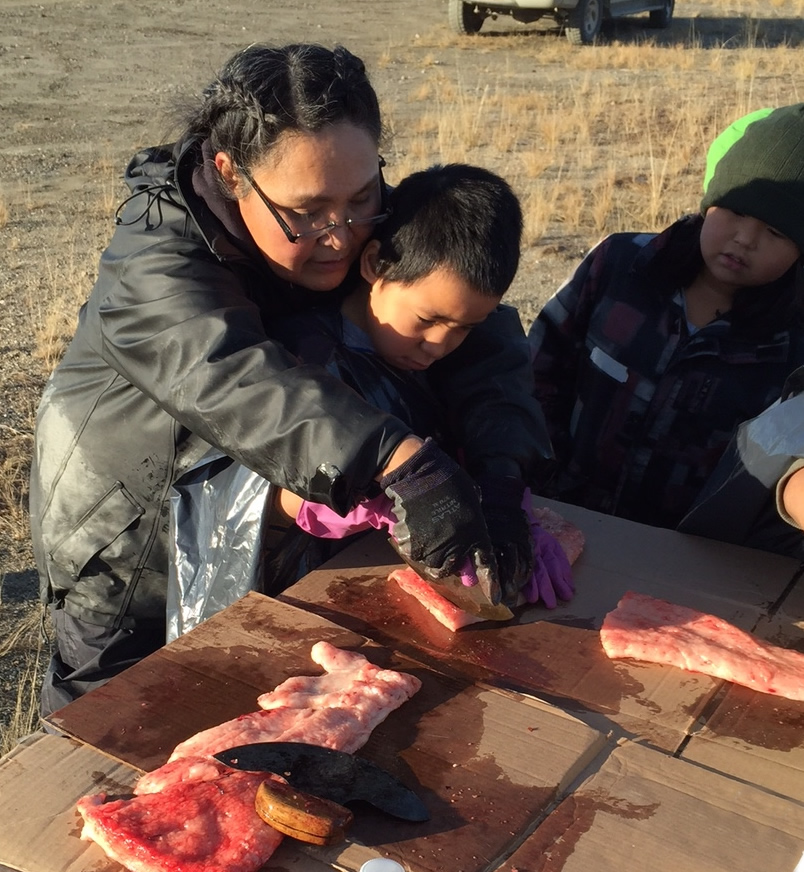Native Alaska

Subsistence is using the biotic natural resources of the animals and plants for food, shelter, clothing, transportation, handcrafts and trade. Since modern industry and employment is minimal in this part of the world, subsistence is very important! Native NW Alaskan hunting and gathering traditions have been handed down from generation to generation.
In this part of Alaska, we are semi-arctic. The Eskimos have been here for over five thousand years. Many of the Northwest Alaska Eskimos are the Iñupiat. The Iñupiat Native Alaskan Community comprise the largest indigenous population of the Seward Peninsula including Nome and White Mountain.
Our culture of Eskimo subsistence consists of gathering, hunting, fishing, tools, food preparation, clothing and shelter. Since modern industry is negligible on the Seward Peninsula except for oil, king crabs and TV reality shows, subsistence is very important!
We do have the four seasons, but our summer is 8 weeks long: end of June to the beginning of August. We have the midnight sun here and on the longest days we have just a couple hours of “darkness.” Our winters are long but we harvest our natural resources throughout the year. This is subsistence living.
The muskox, caribou, moose are the hooved game animals in this part of Alaska. They provide hardy meat and hides for the Alaskan people. The sea is also an important provider of food. Marine animals such as beluga whales, seals, walruses, saltwater fish, crabs and other crustaceans are available for sustenance in season. Birding, egg, picking greens and berries are very important to life on the tundra. One of the most essential food sources is the salmon that are found in the freshwater streams in the summertime. Most of the summer months are filled with catching, cutting, smoking and drying the salmon for the rest of the year.
Sometimes the land is dangerous with predators such as bears. But often, the weather and the sea can be our greatest adversary. Inland on the Seward Peninsula we have Cold temperatures into -40°’s F! The sea brings us food but also brings storms and uncertainty. We depend on our families and friends. Our great faith carries us through.
The Native Alaskan People keep their cultural traditions such as respect for the elders, community, family and celebrations. Handicrafts, food preparation and customs have been relayed by traditional knowledge through the generations.



Quote by Patricia L. Cochran:
Patricia Longley Cochran (Sigvonna), “ANSC: Traditional Knowledge” Alaska Native Science Commission- Bringing together research and science in partnership with the Native community, 2000-2005.

Cochran, Patricia Longley, and Alyson L Geller. “The Melting Ice Cellar: What native traditional knowledge is teaching us about global warming and environmental change.” American journal of public health vol. 92,9 (2002): 1404-9. Retrieved June 10, 2020
“Iñupiat Heritage Center | The North Slope Borough.” North Slope Borough, North-Slope.org, 2015, Retrieved June 10, 2020
Patricia Longley Cochran (Sigvonna), “ANSC: Traditional Knowledge” Alaska Native Science Commission- Bringing together research and science in partnership with the Native community,1993-2005, Retrieved June 30, 2020
The International Boreal Forest Research Association. “About Boreal Forests.” IBFRA.org, 2016, Retrieved June 12, 2020
U.S. National Park Service. “Subsistence: Preserving a Way of Life – Gates of The Arctic National Park & Preserve (U.S. National Park Service).” Gates of the Artic, National Park and Preserve, NPS.gov, 28 July 2016, Retrieved June 10, 2020
Webster, Donald H., and Wilfried Zibell. Inupiat Eskimo Dictionary. Fairbanks, AK, Summer Institute of Linguistics, Inc.- University of Alaska College, 1970.
In conclusion, the Native Northwest Alaskan traditions of Iñupiaq subsistence are kept alive by sharing knowledge and customs. We can share our experience with the next generation. But today we can even share these traditions with our neighbors throughout the world in the context of ecotourism. We can extend an invitation to learn about Native Alaskan life in person at Northwest Alaskan Adventures, LLC.
